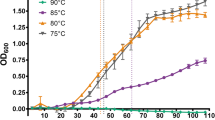Abstract
The psychrotrophic bacterium Aeromonas hydrophila 7966 was subjected to cold shocks from 30°C to 20°C, 15°C, 10°C, or 5°C, or were incubated at low temperature to determine its adaptative response. The cell protein patterns analyzed by two-dimensional electrophoresis revealed that only a few proteins were underexpressed, whereas numerous new proteins appeared with the decrease of temperature, and some others were overexpressed. Among them, a few constituted cold shock proteins because they were transiently induced, whereas others belong to the acclimatation family proteins. Two cold shock proteins of 11 kDa were synthesized at low level because they were visualized only after radiolabeling or silver staining. Moreover, under our experimental conditions, no major cold shock protein of a molecular mass similar to that of E. coli (7.4 kDa) could be identified.
Similar content being viewed by others
Author information
Authors and Affiliations
Rights and permissions
About this article
Cite this article
Imbert, ., Gancel, . Effect of Different Temperature Downshifts on Protein Synthesis by Aeromonas hydrophila . Curr Microbiol 49, 79–83 (2004). https://doi.org/10.1007/s00284-004-4277-8
Issue Date:
DOI: https://doi.org/10.1007/s00284-004-4277-8




